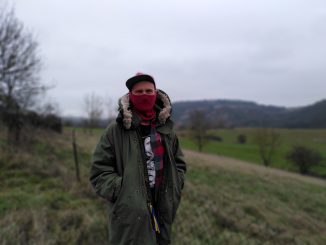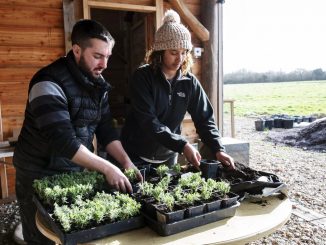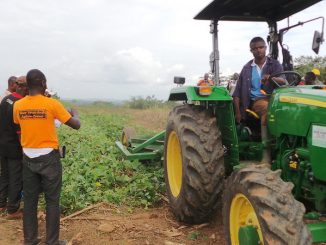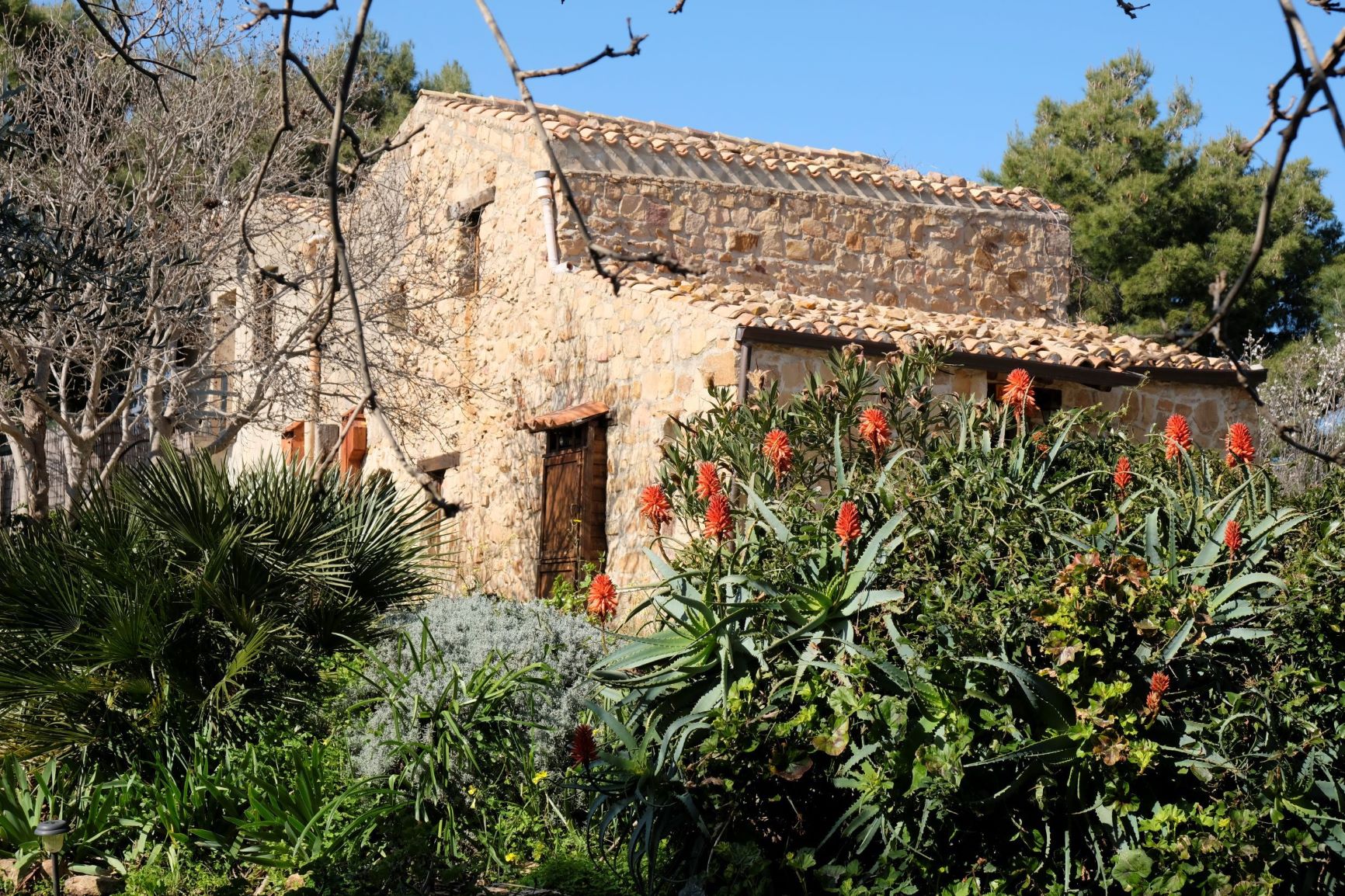
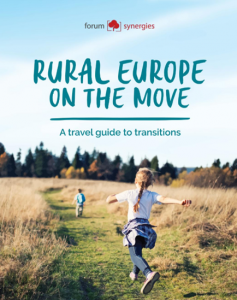
The plights of rural Europe are by now well-documented – depopulation, political invisibility, in some instances the rise of populism and a barrage of negative stereotypes as backward, culture-less and lethargic places. Raised far less frequently are the unique contributions these areas offer the European community and the dynamic and innovative ways some areas are responding to the greatest challenges facing this continent.
Forum Synergies is an organisation which since its inception 25 years ago has identified and highlighted the potential of rural Europe. Gathering local communities, farmers, foresters, environmentalists, and political decision-makers from across the continent, the organisation has demonstrated and bolstered grassroots rural sustainability, arguing that separate from EU policy-making, individuals and groups across the continent are building sustainable, resilient rural futures of their own accord.
Rural Europe on the Move: A travel guide to transitions collects some of these tales. Written by 12 authors and edited by Hannes Lorenzen and I, the book travels from the Isle of Eigg in Scotland to Transylvania, from Latvia down to Portugal to explore how rural communities have responded to climate breakdown, the refugee crisis, the mafia and the concentration of land ownership. It reveals the importance and value of intergenerational collaboration, traditional knowledge, constructive communication and cross-continental exchange in creating resilient rural areas. Crucially it is an invitation to young people across the continent to get stuck in.
An example of young people who are doing just that is the European Rural Youth Parliament, an engaged network of young people working on rural development in their communities across Europe. At the end of January, they were welcomed to Brussels to meet members of the European Parliament and civil society to discuss the opportunities and challenges facing rural youth.
Here is a flavour of the book: the final chapter. Based in Sicily, between the agave and the prickly pears and over local goats cheese and home-made pasta, I speak to young people – Carlotta, Federico, Michele – who’ve thought up all sorts of innovative ways to get young people out of the city by helping them access land and tell tales of how civil society repatriated land stolen by the mafia. Sicily is the location of our final meeting to write the book and so I reflect on this process and look forward to what might lie ahead. The rest of the book can be read online here. or ordered as a hard copy. Enjoy.
Sicily is definitely the best place in Europe to inhale a spirit of creative resistance against hidden superpowers – like the mafia. Sicily is where civil society like the association Libera has achieved what for a century seemed impossible. Mafia victims collected over a million signatures for a law promoting the re-use of land confiscated from the mafia for social and environmental transformation – and were successful.
What no government before had done, Libera Terra brought together small farmers, the unemployed and newcomers to rural life, who started producing pasta, olive oil, wine, honey, legumes and cereals for direct marketing and fair prices. The movement was carried by consumers and people across Europe who wanted to see the land back in the hands of the original owners and young people with a spirit of transition to resilient production methods.
Not guests, inhabitants
“When we founded this Centro di Educazione Ambientale Serra Guarneri in Cefalù we chose this wild and remote place in the Sierra Guarneri because it has this strong energy for profound change. Sicily needs new care for nature and new ways of living together between people. We are an environment education centre and learn ourselves from nature every day. So we do not see you as our guests, you are inhabitants, citizens of Guarneri, and you always have a home here,” Giuseppe Burgio welcomes us.
We are here for the final gathering for our collective book writing project, nestled between the prickly pears, the agave and the palmaneras on the edge of Madonie Regional Park in northern Sicily. This place is about 200 years old and began as a place of exchange of goods, a ‘marcato’. It was always an open space, all those who wanted to enter could do so, and this spirit lives on today.
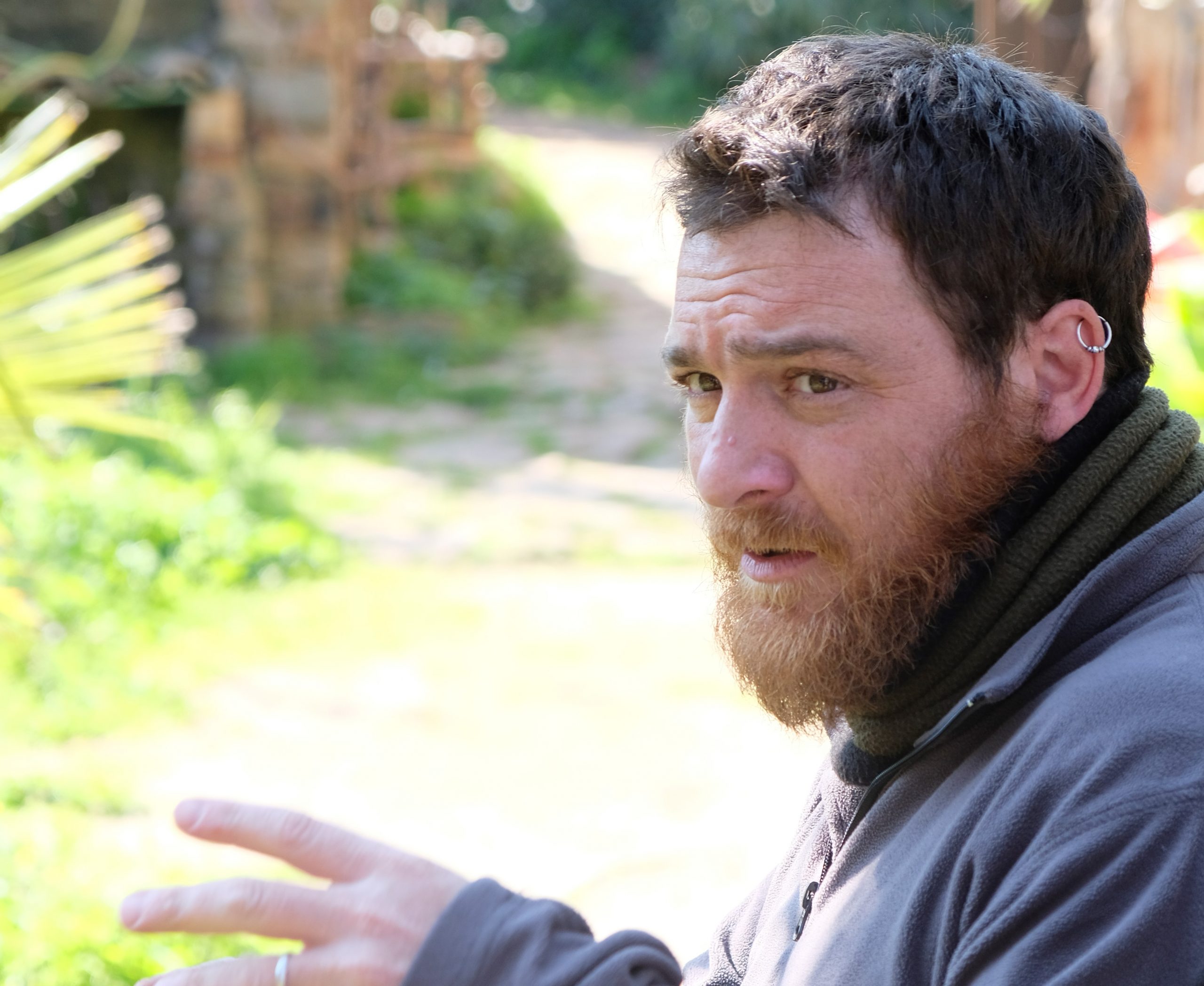
Creative confrontation
Forum Synergies has long known the significance – ethical, political, personal – of these spaces of creative confrontation. The founders decided long ago that it was not enough to read’about rural development, both successes and failures, it had to be something that was experienced, felt. They travelled across the continent to see how people were enacting rural development. A simple idea, but an important one.
We live in a time of profound uncertainty. I write this from the UK in the midst of increasingly absurd Brexit chaos, while the continent as a whole faces the looming threat of a fragmenting European project coupled with a widespread politics of scaremongering. I believe that a lot of our capacity to act with empathy toward others relies on a confrontation with them. In these times, this confrontation with the supposed other has never been more important. We know that in the space of this confrontation, empathy or at least tolerance may be cultivated to counter this politics of fear – if you map it, you can see with some clarity that those areas harbouring the most xenophobic beliefs are often those with the fewest immigrants. We fear what we do not know and we live in a political system where some want to capitalise on these fears.
Prickly pears and other sticky things
Federico Coppola serves up our first meal as we perch on benches overlooked by a giant agave in the afternoon sun. Our skin is pasty from the winter months and our bodies warm up and unfold in the gentle warmth and bright colours of the Mediterranean. We begin with a local goat’s cheese from the shepherd who roams the rocky crags above us. We can even hear the goats now, their bells cutting through the quiet. As he serves, Federico tells us the stories of this food, whose hands have tended the soil from which it was plucked and what the flavour pairings might tell us about Sicilian history.
Federico is an ideal collaborator for this leg of our collective writing journey. Not only does he nourish our bellies with delicious local fare, he also invites various friends to dinner to talk us through the work they are doing to ensure local rural sustainability.
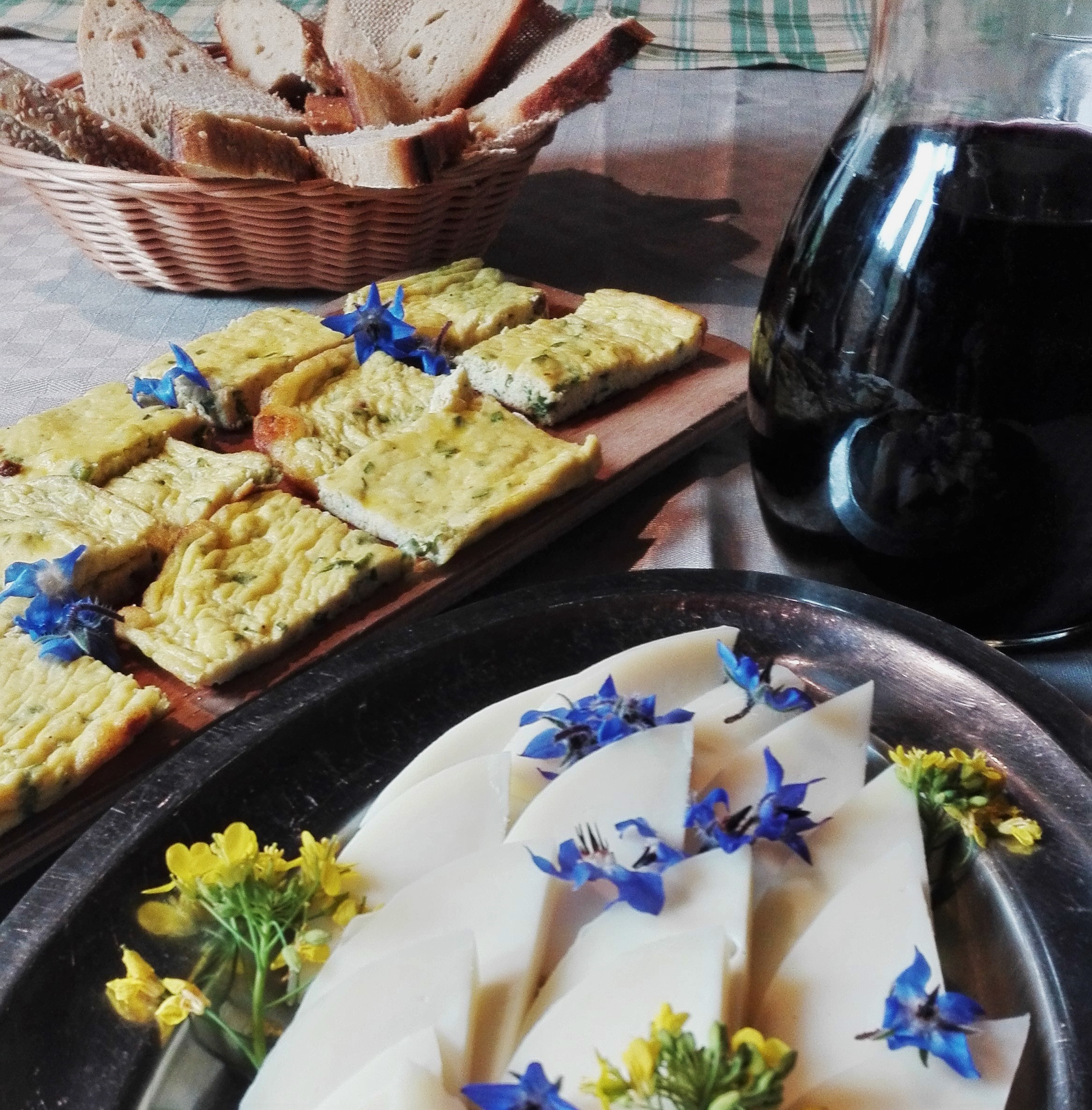
Mutual aid revival
One such friend is Michele Russo who runs a prickly pear farm in Caltagirone. With his explanation of the regional mutual aid network, we get a more concrete idea of the way various projects in the network cooperate. Participants meet once a month to help each other out, for example when composting, preparing the soil, planting and harvesting. They exchange seeds and collaborate on forestry projects. “It is an occasion to leave your project,” says Federico, “to meet and share updates, explore different landscapes in the same territory and exchange products, seeds, knowledge and to celebrate together.”
What is exciting for me about these spaces of confrontation is that they make room for the sticky things. There are not always easy answers, simple questions may yield a multitude of valid responses. But in a time of increasing political polarisation, the split of many countries and peoples into enemy camps is dangerous. We are left with those for and those against. Right and wrong. Moral and immoral. Good and bad.
In these times more than ever we need to value complexity and nuance, understanding that there exists a whole host of legitimate perspectives and we need to talk the issues out. Let us ‘together’ tackle the question, seeing our conversation companion not as friend or enemy, as Jenny unpicked for us in chapter 2, but with the aim of ‘together’ understanding better, improving our collective knowledge of the issue at play.
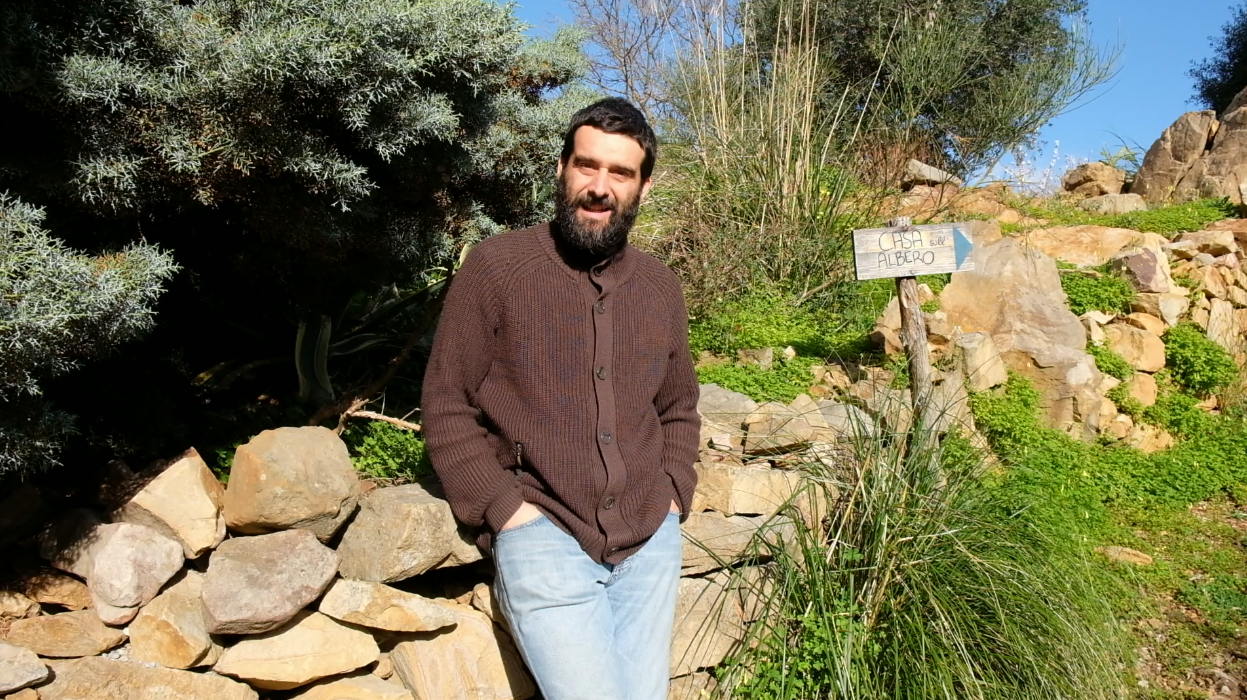
The collective writing challenge
“This is like doing a puzzle where I don’t know what the final image is,” Camille sighs in exasperation. Nine of us authors sat at one of the chapters in a large, light-filled work room overlooking the Mediterranean. I have to agree. We’ve been working on the book now for almost a year and we still lack a coherent idea of what we may be able to produce. We have so much material, so many stories we want to tell and hopes to share. We’ve written and rewritten, edited and cut out, replaced and restructured. The text is a patchwork of memories and aspirations, fears and worries and importantly those burning glimmers of hope.
This writing process was an experiment, a risk, like eating Mateja’s wild asparagus back in Slovenia last year. This was necessarily risky, but I believe because of that opened up space for the unexpected and gave us permission to be creative, playful even. After all, the stories you read on these pages are ones of people who have done things differently, people who have not waited to be saved but who have taken rural sustainability into their own hands and ‘tried things out’.
Experimenting with alternatives
“The alternative to the current political-economic system, which pillages the Earth and exploits its human and non-human inhabitants, lies not in replacing it with a fixed other system, laden with its own set of problematic power dynamics. No, it lies in experiments, in enacting alternative ways of living and producing from the bottom up,” I argue. Federico nods next to me, as we sip the whisky Hannes and Oliver have picked up on the way to Sicily. It makes sense that Federico agrees with me because part of the work of Porto di Terra is just that: a place for playing with ideas and putting into practice ways of co-existing with each other and other animals, producing food and stewarding the landscape.
Eight young people live at Porto di Terra – botanists, educators, conflict management experts, agro-ecologists and sustainable development experts. “We believe transitional practices that work toward profound social transformation should not be limited to the cities. Rural areas can be dynamic, progressive and experimental,” Federico shares.
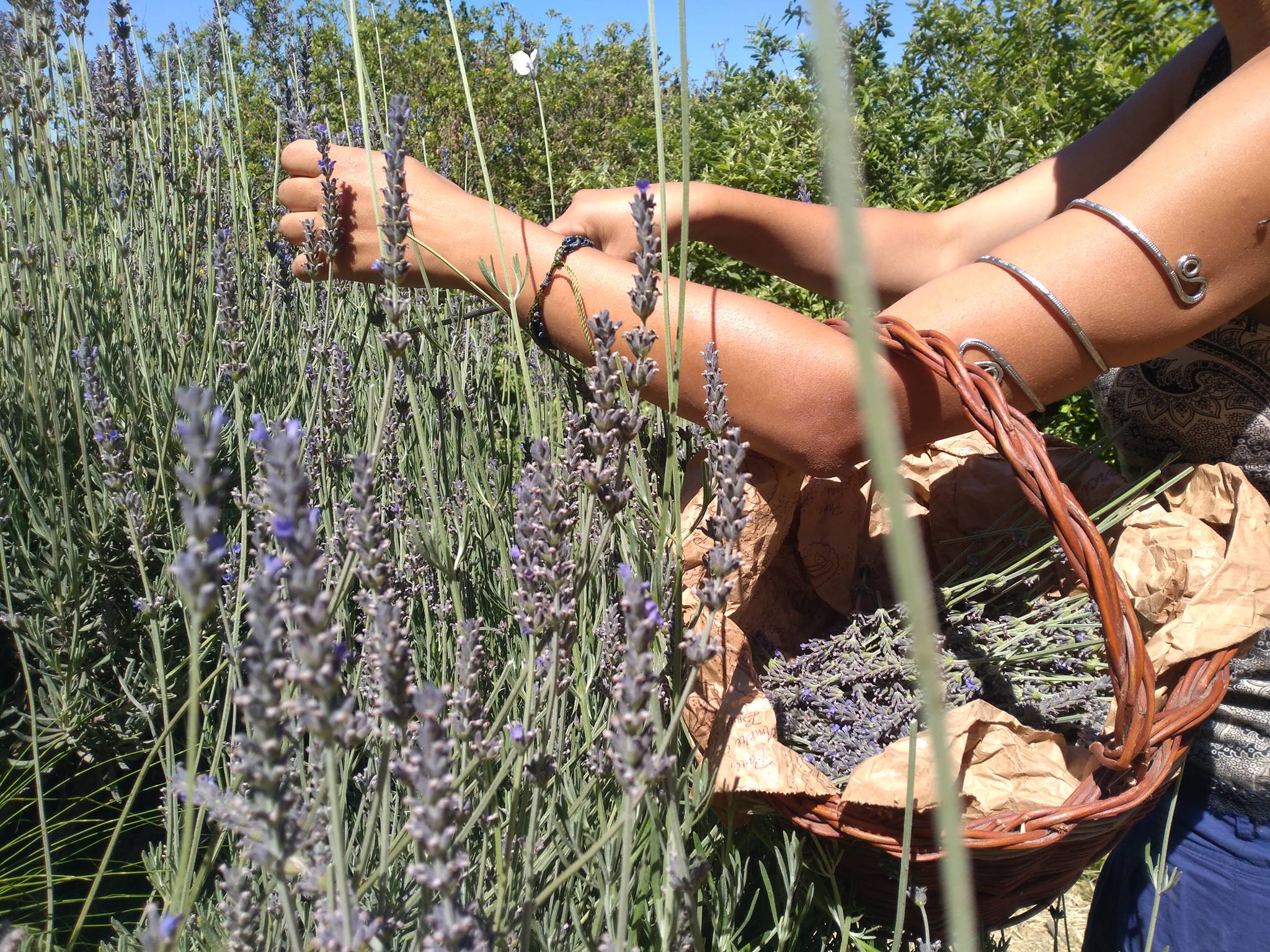
Listening to him and the friends he brought to dinner – Carlotta, Michele and others – I am left with a real warmth. They really ‘care’ about environmental protection, rural sustainability and more just and healthier futures. It is a care that bubbles over and flows into you at the dinner table, motivates you to question your own work and get stuck in.
Cultivating a new rural reality
It is a care that also leaves me hopeful. Sifting through these chapters, you get a picture of rural Europe: its beauty and vibrancy, its complex history and its current and future challenges. Time and again, our writers lamented the loss of the young from rural areas. Seeking better opportunities, across the continent, many young people have moved to cities and abroad.
But the story does not end there. Some have stayed, some have returned and some urbanites are moving to the country for the first time. Several are friends of mine, keen to get their hands in the soil and ensure healthier air and wild play for the children they hope to have. Porto di Terra is one such space that connects and supports these people and their projects. As we have seen in Karditsa, in Beaufortain and in Transylvania, access to land is often one of the key reasons young people move out of the countryside.
“We rent the land here, in formal and informal loans from local, elderly landowners,” Carlotta Ebbreo tells me. “They say: “Here you can have it for five years to try out your projects on the condition that you look after the land, maintain it from fire hazard.”” This land is often cheap or free and allows young people to get their foot in the door, put into practice their ideas and see if they work without too much financial loss. Again, a simple but powerful idea. It has its limitations though, since it does not provide the stability for those leasing the land to make the kind of long-term plans that make peasant agriculture viable. Nonetheless, at least for the time being, it creates a kind of intergenerational cohesion and ensures careful stewardship of the land.
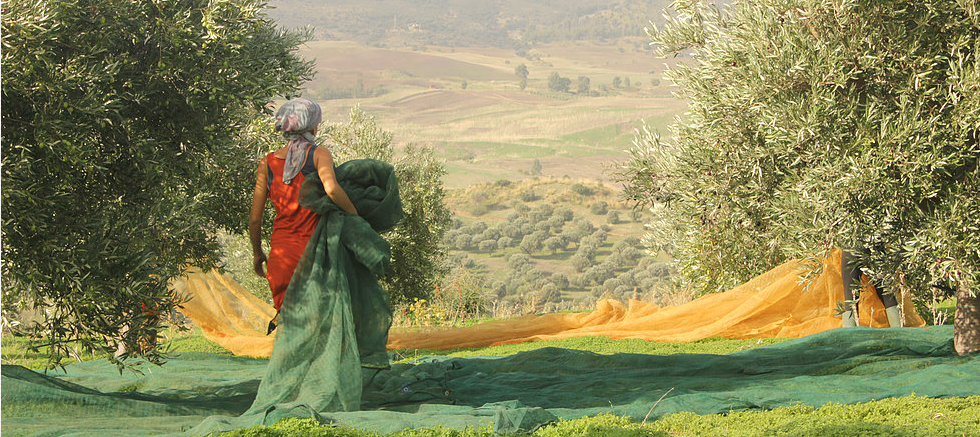
Seeds and cycles
“So what now?” Simone asks on our final evening together, “what’s our next project?” She would like to work on seeds, because it is the beginning and the end of all. This theme follows on well from a collective writing project. And it is something that touches me.
A seed is quite a miraculous thing. It is seemingly inert, dead even, but within it is embedded the ‘potential for life’. It waits for the optimal intersection of soil and temperature and moisture before bursting into life. In a certain way, it straddles life and death.
In saving seed, you are saving biological and cultural heritage. You are also working toward the future, you are involved in creating rich culinary and natural landscapes for generations to come. When you save seed in spring for collecting, cleaning, storing or then sowing at the end of the season, you operate in cycles. Much of the natural world operates on a more cyclical temporality than we are accustomed to: it relies on diurnal, monthly, seasonal cycles along which growth and death and regrowth occurs.
I think of these cycles as a kind of looping forward, not unlike the understanding Liliana and the Misak people, mentioned by Camille in chapter 3, have of circular time. Seeds and their stewards both operate on these cyclical timescales, moving forward and incorporating adaptations, the past and future enfolded.
Ebbs and flows of time
This book has also unfolded in ebbs and flows, like the North Sea tides around Pellworm. We’ve looked back at the key events and meetings and feelings which have spurred our own work, which have birthed new projects, collaborations and friendships. We’ve looked back to look forward: we don’t want overly to reminisce or romanticise the past but rather to learn from it. What worked? Which rural development initiatives or approaches should we look to? Which missed the mark? Why? This is about passing on and sharing knowledge and experience.
It all begins with a seed and those sat around the table all have some seed story to share. Hannes negotiated almost four years as staff expert of the European Parliament to achieve free access and marketing of traditional and diverse farm seeds in Europe. Camille shares the story of her island’s seed network and I mention my own little London Freedom Seed Bank back home. Maybe we are just launching the next Forum Synergies adventure. Already themes and questions begin to form in our minds, we think of seed experts and enthusiasts who must be involved, projects which we should visit. Expertise and experience are abundant. This seems to be the Forum Synergies approach, informal, warm collective plotting. One person shares an idea and everyone builds upon it with their own unique perspective.
Welcome on board!
This book and the many stories we find within, opens at least as many questions as it answers. The project, the move toward real European rural sustainability, is certainly not over. In these pages you find stories of on-the-ground projects which have succeeded and others which have worked less well. You discover particularly stunning natural environments and the host of unbelievably diverse and innovative projects which populate our rural landscapes. You learn about threats to rural livelihoods and environmental preservation, and the various ways rural communities have come up with their own solutions to this. Most of all, you are introduced to the remarkable people and projects driving this change forward.
Much has changed in the past 25 years. Europe is different and the challenges we face as a continent now are profound. This book is an invitation, a call to action, a field guide for inspiration and hopeful futures. Get stuck in. Visit the projects we’ve mentioned. Join Mónika for a palinka in Transylvania. Hannes is happy to take you for a walk on the bottom of the North Sea, and Simone is keen to share the Lesachtaler bread. Whatever your own interests in rural sustainability, I’m sure you can find the information you need somewhere in here, from sustainable forestry with Artur, food cooperatives with Marina, community land ownership with Camille, or national rural networks and parliaments with Anita.
The story of rural sustainability does not end here. This is the handover. Welcome on board.



